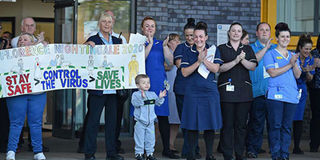The invisible one million that are too frightened to seek medical aid

National Health Service workers participate in a national "clap for carers" to show thanks for the work of Britain's NHS workers and other frontline medical staff around the country as they battle with the novel coronavirus pandemic, at Aintree University Hospital in Liverpool on May 14, 2020. PHOTO | OLI SCARFF | NATION MEDIA GROUP
What you need to know:
- Asylum-seekers, political refugees and victims of torture who have been awaiting decisions for years sleep on the streets because they are reluctant to seek help.
- The irony is that this largely invisible segment of society contains trained doctors and nurses whose skills would be invaluable during the current Covid-19 crisis.
One of the scandals of modern Britain is that within our so-called liberal democratic society, there are sick people who are frightened to go to hospital for fear of the authorities.
These people are immigrants without the right to remain. There are thought to be nearly a million individuals whose legal status is unclear or under review.
Asylum-seekers, political refugees and victims of torture who have been awaiting decisions for years sleep on the streets because they are reluctant to seek help.
This poses risks to the wider community, as one editorial writer noted: “The presence of a section of the population that dare not seek medical help for risk of being arrested, or would not be given help if they sought it, has created a potentially dangerous reservoir of untreated disease.”
The irony is that this largely invisible segment of society contains trained doctors and nurses whose skills would be invaluable during the current Covid-19 crisis.
Many have volunteered for the National Health Service, but they are banned from working without permission.
A solution to this cruel and inhuman situation has been proposed by experts in the refugee area, namely a temporary grant of Leave to Remain status to everyone with outstanding applications and to those with unclear immigration status.
Sarah Teather, UK director of the Jesuit Refugee Service, said, “This would allow people to access the support they need and join the work force. It is time to respond to an unprecedented situation in a fresh way.”
* * *
I was deeply sorry to learn last week of the death of my old friend and Nation colleague, Chege Mbitiru.
Sharing an office with Chege, I got to know him well – a clever, thoughtful, undemonstrative man, tough and quietly sceptical of the world around him.
An elegant tribute by another old friend, Henry Owuor, demonstrated this scepticism perfectly when he quoted Chege’s advice to young journalists: “If your mother says she loves you, check it out.”
My own best memory concerns an incident Chege told me about, which I related in my book, Birth of a Nation.
Working as senior editorial writer, Chege was called in by the then editor and instructed to write a leading article against a prominent politician. Chege said, “I’m not interested.”
The editor leaned back and put his gun on the table and said, “Chege, I’m in charge here.”
Chege takes up the story: “I walked carefully out of the door and went to a dance with my girlfriend, now wife, and we danced all night. Next morning, I got a plane to New York and did not come back for a year.”
Rest in peace, old friend.
* * *
If self-isolationists ever tire of doing puzzles during the current virus crisis (see this column last week) the BBC has other suggestions.
One is How to Make Your Own Face Mask. The government is encouraging the use of face coverings on public transport and in shops on those occasions when we do leave home. The trouble is no masks seem to be available.
Never fear, the BBC website lays it all out: Take a handkerchief measuring 50cm by 50cm; fold it in half; fold the top third down and the bottom up; thread on two elastic bands 12 cm apart, tuck in the two ends and, Hey Presto, a face mask!
My handkerchiefs must not be as posh as the BBC’s because they only measure 37cm by 37cm. Still, here goes: Fold, fold, fold; thread, thread; tuck, tuck.
Maybe my elastic bands are cheapos, too, because when I raised the mask to my face, the right hand one flew into the top corner of the room, stinging my ear as it went, while the left one snapped feebly in half.
Oh well, I wasn’t planning to go out anyway.
* * *
The 75th anniversary last May 8 of the end of the Second World War in Europe brought memories flooding back for the dwindling numbers who remember the day and provided history lessons for those too young.
Our wartime prime minister, Winston Churchill, was memorialised widely for his leadership, stubbornness, courage and eloquence. Tributes were also paid to a lesser-known characteristic – his wit.
For example:
Playwright George Bernard Shaw: “I enclose two tickets for the first night of my new play. Bring a friend, if you have one.” Churchill: “I cannot attend the first night of your play, but I will go to the second, if you have one.”
MP Nancy Astor: “Mr Churchill, if you were my husband, I would put poison in your coffee.” Churchill: “Madam, if you were my wife, I would drink it.”
MP Bessie Braddock: “Mr Churchill, you are drunk.” Churchill: “Mrs Braddock you are ugly, but I will be sober in the morning.”





